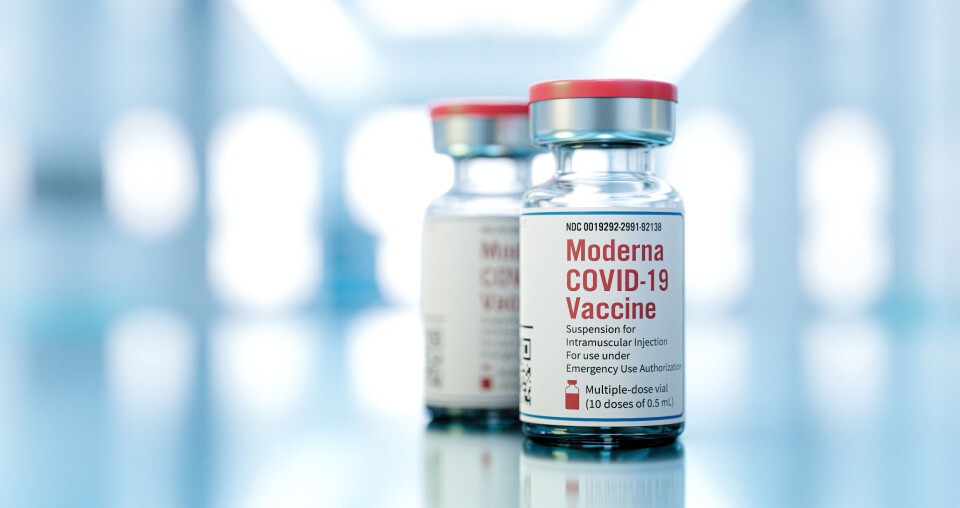-
How many Americans live in Paris - and where else are they choosing in France?
Over a quarter of all US nationals in France live in the capital city
-
Price rises for Netflix in France
The Standard (with ads) and Premium packages are increasing by €24 a year
-
Leclerc supermarkets to sell car fuel at cost price for Easter
The initiative will apply to diesel, petrol, and LPG
French health authority advises against Moderna jab for under-30s
A study shows that men aged 12-29 are more at risk of heart problems after the jab – but the benefits of getting vaccinated still outweigh the risks, experts reiterate

France’s national health authority has advised against the Moderna Covid vaccine for under-30s after a study showed a slightly higher risk of heart problems.
La Haute Autorité de santé en France (HAS) has based its recommendation on a major study conducted by Epi-Phare, a grouping of health and medicine agencies l'Assurance maladie (Cnam) and l'Agence du médicament (ANSM).
The study, published on November 8, looked at everyone aged 12-50 who had been hospitalised for the specific heart problems myocarditis and pericarditis between May 15 and August 31 this year.
Both are heart inflammation conditions - the first affects the main cardiac muscle and the second the heart membrane.
The study found that there were 919 cases of myocarditis and 917 of pericarditis. Of these, 60% and 36% respectively were aged under 30.
It found that the Pfizer vaccine, but particularly the Moderna vaccine, slightly increased the risk of these problems in the seven days after vaccination.
The study found that there were 26.7 cases of myocarditis linked to the vaccine for every million doses of Pfizer, and 131.6 cases for a million doses of Moderna. This equates to one case of myocarditis for every 37,500 doses of Pfizer, and one case per every 7,600 doses of Moderna.
The risk of pericarditis was “equally as marked” after a second dose of Moderna among young men aged under 30 (one case per 56,200 doses), but less so than of myocarditis.
Men under 30 – aged between 12 and 29 – were at a slightly higher risk than women overall.
As a result, the HAS said it “recommends, for the under-30s, when it is available, use of the Pfizer vaccine, whether for the first vaccination or the second”.
It added that the Moderna vaccine, “for which effectiveness seems slightly higher, can be used for a first vaccine and for the administration of a booster, in a half-dose for subjects over 30”.
It comes after the HAS recommended that the Pfizer vaccine be used exclusively for booster doses.
Epidemiology and public health professor Mahmoud Zureik, director of Epi-Phare and lead of the study, said: “The fact that these excess cases occur very quickly (after the injection) makes it possible, among other arguments, to attribute this risk to the vaccine, because it cannot be due to chance.”
However, Professor Zureik said that “this is not necessarily surprising”, because “under normal circumstances, cases of myocarditis and pericarditis that occur in the population are already more frequent in young men”.
‘Benefits still outweigh the risks’
The professor said that the effectiveness of the vaccines still outweighed the risks involved.
He told AFP: “The number of cases are very rare given the number of doses administered. The risk exists, but the benefit-risk balance remains favourable, given that the vaccines are 90% effective against severe forms [of Covid], even for young people.
“When we balance the effectiveness of the vaccines against severe forms of Covid (90%), and the existing but very rare risks of myocarditis and pericarditis, the benefit-risk of vaccines is not in doubt,” he said.
All patients recovered from the conditions, the study also noted. No death was reported over the period of study, and the average time of hospitalisation was two to four days.
The HAS also reiterated its message that as many people as possible should get the vaccines, especially as recent figures show that the epidemic is currently worsening in France.
It said: “The epidemic is currently on the upswing and it is difficult to predict how it will evolve, but the onset of winter, combined with the predicted decline in vaccine efficacy in those vaccinated before the summer, is a further reminder of the importance of achieving the best possible vaccination coverage of the entire population, and in particular of those most likely to develop a severe form of Covid-19.”
It also said that it is necessary to “maintain a high level of protection by getting a booster dose for the most vulnerable people and those most exposed to the virus”.
The recommendations come ahead of President Emmanuel Macron’s speech on the government’s plans to manage Covid over the winter. He will speak on TV today (November 9) at 20:00.
Related articles
Surge for Covid booster doses in lead up to Macron’s Tuesday TV speech
President Macron to give Covid update in TV speech on Tuesday at 20:00
























